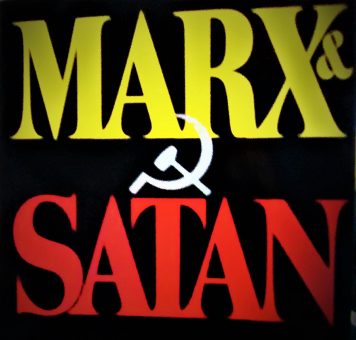Hess speaks persistently in religious terms, but he does not believe in God. He writes that “our God is nothing more than the human race united in love.” The way to arrive at such a union is the Socialist revolution, in which tens of millions of specimens of his beloved mankind will be tortured and killed.
He makes no secret of the fact that he wishes neither the domination of heaven, nor that of earthly powers, which are both oppressive. There is no good in any religion, except that of social revolution.
It is useless and inefficient to elevate the people to real freedom and to make them participate in the goods of existence, without freeing them from spiritual slavery, i.e., from religion.
He speaks in one breath about “the absolutism of celestial and earthly tyrants over slaves.”
The Satanic depths of communism can be understood only by knowing the kind of man Moses Hess was, for he influenced Marx and Engels, with whom he founded the First International, as well as Bakunin. Without a knowledge of Hess, Marx is unintelligible, because it is he who brought Marx to socialism.
Consider Marx’s words already quoted:
Words I teach all mixed up into a devilish muddle. Thus, anyone may think just what he chooses to think.
Marx wrote in such a manner. Hess’s writings are an even more devilish muddle, which are difficult to untangle but which must be analyzed for possible a connections between Marx and Satanism.
Hess’ first book was called The Holy History o f Mankind. He proclaimed it to be “a work of the holy spirit of truth,” saying further that as the Son of God freed men from their own slavery, Hess would free them from political bondage. “I am called to witness for the light, as John has been.”
At that time Marx, who was still opposed to socialism and had not known Hess personally, started to write a book against him. For unknown reasons, this book was never completed. He later became Hess’s disciple.
As previously indicated, Hess’ avowed aims were to give a last kick to medieval religion and to produce ravages. In the introduction to his book Last Judgment, he declares his satisfaction that the German philosopher Kant had allegedly “decapitated the old Father Jehovah together with the whole holy family.” (Hess covers his own ideas with the name of the great philosopher. Kant had had no such intentions. He had written to the contrary: “I had to limit knowledge to make place for faith.”)
Hess declares the Jewish as well as the Christian religion to be “dead,” which does not prevent him from writing in Rome and Jerusalem about “our holy writings,” “the holy language of our fathers,” “our cult,” “the divine laws,” “the ways of Providence,” and “godly life.”
Pages: 1 2 3 4 5 6 7 8 9 10 11 12 13 14 15 16 17 18 19 20 21 22 23 24 25 26 27 28 29 30 31 32 33 34 35 36 37 38 39 40 41 42 43 44 45 46 47 48 49 50 51 52 53 54 55 56 57 58 59 60 61 62 63 64 65 66 67 68 69 70 71 72 73 74 75 76 77 78 79



